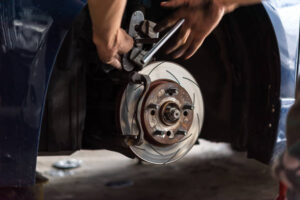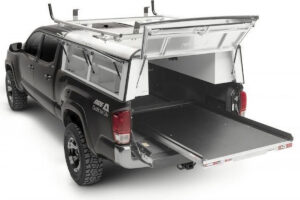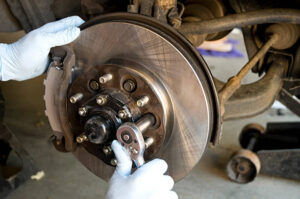
How to Identify Common Brake Problems
How to Identify Common
Home » Ensuring Safe Braking: A Guide to Brake Preventive Maintenance

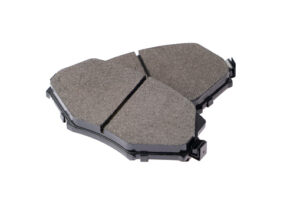
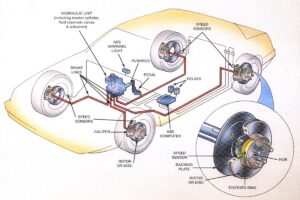
A lot of off-roaders worry that upgrading to bigger tires will affect their ABS system, and cause it to not work as it should. We’re here to tell you that your ABS system will be fine …
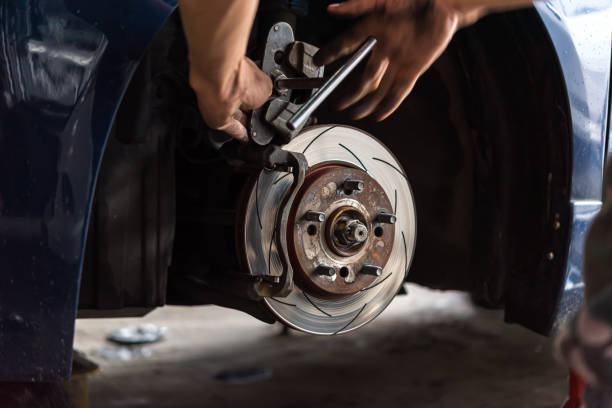
Ensuring the safe operation of any vehicle, both on and off-road, requires brake security and preventive maintenance. Proper maintenance and inspection of your brakes can prevent accidents and save you time and money in the long run. In this article, we’ll cover some essential points to help you keep your brakes running smoothly.
Preventive maintenance and regular inspection are crucial for safety and addressing potential problems early on. Look out for signs of wear or damage, such as uneven pad wear, warping, marks, or corrosion of the brake rotors, and leaks, swell, and damage in the brake lines. Check the fluid level and condition and ensure that the brake pads have enough lining compound and thickness to function correctly without damaging the rotors.
Your brakes are a system, and if one component fails, the entire system may fail. While some parts are more critical than others, it’s best to avoid unnecessary risks. Remember that brake components have a lifespan that varies depending on your driving habits, road conditions, and weather, among other factors.
It’s also important to know that other parts affect your vehicle’s braking performance and require appropriate maintenance. For instance:
By considering all these factors, you can ensure the optimal performance of your vehicle’s braking system and promote safe driving.
Don’t wait until it’s too late to change your brake pads. Most brake pads have wear indicators called wear tabs; as they are exposed and get in contact with the rotor, they cause a high-pitched metal-on-metal noise as a warning that the brake pads are extremely worn and must be replaced. Don’t wait until the wear tabs are exposed or to see a brake pad indicator light on your cluster; it might be too late, and besides being dangerous, the metal-on-metal friction can damage your brake rotors.
Check your brake pads visually at least every six months and every time you change the oil. If you feel something is wrong with your brakes, check them as often as needed, it won’t do any harm. You can check your brake pads yourself, as shown here, or let your trusted mechanic do it for you.
When it’s time to replace your brake pads, it’s always best to spend a few extra bucks and purchase the best product you can buy; safety can’t be bought with money. You can find more about brake pads and lining compounds here.
As you check your brake pads, you will also have a good view of your rotors, and you will be able to spot visible signs of tear and wear like warping, and you will also be able to check their thickness. Brake rotors should last between 30,000 and 70,000 miles; however, their lifespan can be reduced if they are not properly cared for. For example, they can get damaged by neglected and extremely thin brake pads or exposure to sudden temperature changes. You should inspect your brake rotors at least every time you replace your brake pads, but the ideal would be to take a good look at them every time you change your oil
You will find a thorough guide about how to check your brake rotors in this link, or you can ask your trusted mechanic to check them.
Calipers are also vital parts of the braking system; they push the brake pads against the rotors every time you press the brake pedal. They can cause dangerous braking problems if they fail. They aren’t as easy to check as brake pads, rotors, or brake fluid, but it’s important to do so to prevent accidents and unnecessary damage to other braking components.
Calipers are designed to endure extreme conditions, but, like every mechanical component, they can fail. Calipers have pistons that are protected by rubber boots. These rubber boots protect the delicate moving parts from dust, road debris, water, and other particles that can lead to corrosion or make them stick. A good habit is to check them at least once a year or more frequently if you take your vehicle to muddy and difficult off-road trails.
Here you will find an interesting guide about how to check your calipers.
Brake fluid is responsible for transmitting the force from the brake pedal to the calipers. However, it doesn’t last forever. Most vehicle manufacturers recommend changing brake fluid every two years or when you notice a decline in your vehicle’s braking performance, even if the braking system appears to be in perfect working condition. Brake fluid can become contaminated due to cracked brake lines, master cylinder problems, and the passage of time.
Another very important thing is to use at least the fluid type recommended by the manufacturer. However, you should upgrade your brake fluid if you installed a big brake kit or if you use your vehicle for towing or extreme recreative driving, where your brakes will be subjected to more stress and will generate more heat. One of the most important qualities of brake fluid is its boiling point. High-performance brake fluid has a higher boiling point, ensuring that your vehicle will safely stop even in the most extreme conditions.
Brake lines are often neglected until something is wrong. Good brake preventive maintenance wouldn’t be complete without taking care of brake lines as well. They take pressurized brake fluid to the calipers, so they can apply force to the rotors and stop the vehicle; that’s why it’s important to keep an eye on them.
Stock brake lines are usually made of rubber or metal combined with rubber; that’s why they are prone to crack, degrade, and wear out over time. Constantly exposed to temperature changes, weather, dust, mud, and of course, the high pressure caused by braking. They can also tend to swell over time, which can reduce the brake fluid pressure causing your brakes to lose efficiency. They usually don’t completely break and start leaking, giving you enough time to notice the problem and replace them. But you shouldn’t take unnecessary risks; that’s why it’s important to check them regularly to prevent accidents.
Besides, if you usually take your vehicle off-road and subject it to extreme conditions, consider upgrading your brake lines. There are many improved aftermarket brake lines designed to endure the most challenging conditions and incredible levels of brake fluid pressure. Upgrading your brake lines is a great preventive measure to reinforce your brakes and reduce your vehicle’s stopping distance.
Dirt and debris can accumulate in your brake system if left unattended, causing the brakes to lose efficiency. Make sure to keep the brake system’s components clean and free of debris to ensure optimal braking performance and extend its lifespan.
Keep your brakes; remove dirt, dust, and other contaminants that can accumulate over time. You can use a good-quality brake cleaner to remove dirt and debris from your braking system’s most sensitive parts. Keep your brake pads, rotors, and calipers away from oil or other harmful substances. Use a dry cloth to clean your brake components, avoiding contact with other automotive fluids or lubricants.
Keep your wheels clean; they tend to accumulate contaminants and brake pad dust which can contaminate your brakes or get caught between your brake pads and rotors, causing premature tear and wear.
Keeping your brakes clean is essential to ensure optimal brake performance and reduce the risk of accidents.
Brakes reach incredibly high temperatures as you brake, especially when using your vehicle in heavy traffic or on steep terrain, not to mention track days, which deserve an article on their own. High temperatures can cause the brake fluid to boil, as discussed above. That’s why it’s important to use proper brake fluid and avoid using the brakes excessively while they are hot. However, if you can’t avoid using your vehicle under rough conditions: for example, you are an avid off-road driver or you need to haul heavy loads, you can make further modifications to upgrade your brakes and keep the temperature down.
You can achieve this in many ways, but one of the most efficient ways is installing a big brake kit. These kits usually include bigger brake rotors that allow you to install bigger brake pads and are designed to dissipate heat more efficiently because they have a bigger surface. Besides, aftermarket brakes are designed to dissipate heat better, so they are an attractive alternative if you enjoy driving with a heavy foot.
Bear in mind that off-road vehicles are subjected to harder driving conditions and roads than street vehicles. That’s why they need more maintenance, and brakes are no exception.
If you use your vehicle off-road a lot, check your braking system more often and keep it clean. Besides, do quick checks before and after you take your vehicle for an off-road ride.
It’s important to pay attention to any signs of wear or damage. As you drive, you may hear strange noises or feel that your brakes don’t behave as usual. Learning to be aware of these signs and taking action as soon as you notice them will help you ensure your safety on the road and prevent more costly damage.
Brakes are a sensitive part of your vehicle. Knowing how to service your car yourself is great, but don’t hesitate to seek professional help and advice if you have doubts or find problems that exceed your technical knowledge.
If you follow these steps, you will have the peace of mind that you will be driving a safe and as sound as new vehicle. You just have to enjoy your driving and schedule frequent checkups to keep it that way.
